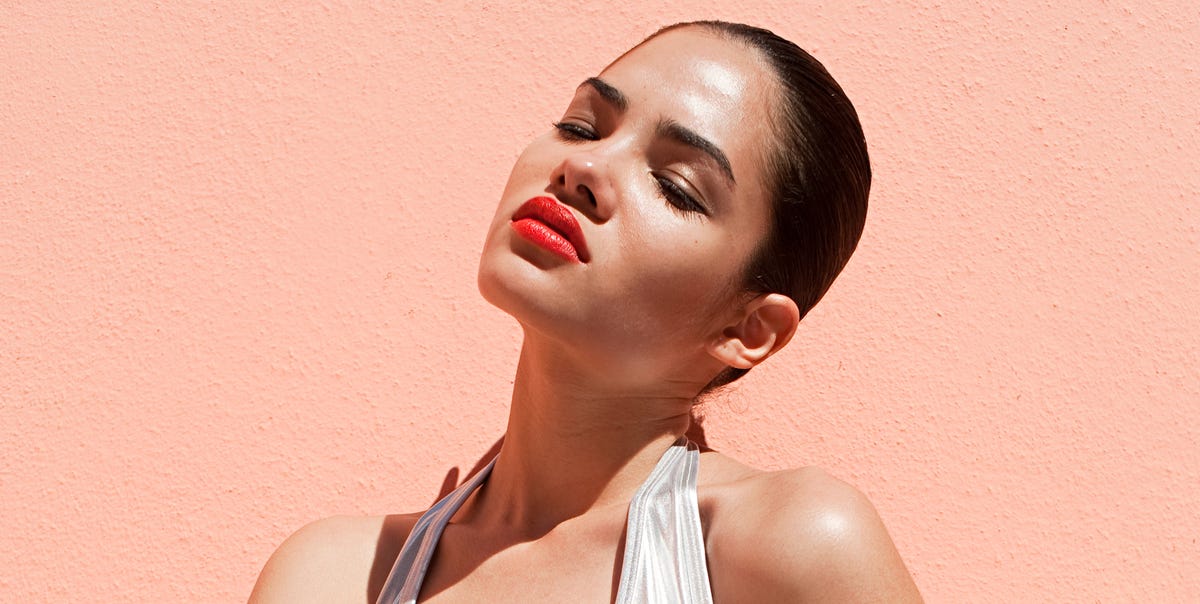Whether it’s blazing hot or you’re bundled up in layers of fall sweaters and scarves, wearing sunscreen daily is a must, both for the look of your skin and its overall health. Regardless of skin tone, sunscreen is a daily, year-round essential because clouds and even windows don’t block all UV rays. Many can still get through and damage your skin. In the short term, that can manifest as hyperpigmentation, dark spots, and even acne. Long term, UV damage can lead to premature signs of skin aging (fine lines and wrinkles) and cause skin cancer.
Still, the temptation to occasionally skip daily SPF application, and especially reapplication, is real, which is where powder sunscreens come in handy. Instead of slathering another layer of liquid sunscreen onto your already made-up, sweat-beaded complexion, you can simply dust on a lightweight powder dispensed out of a tube with a built-in brush.
“Powder sunscreens are a great solution for people who don’t want to mess up their makeup or hair by reapplying sunscreen,” says dermatologist Dr. Hadley King. “They also absorb excess oil, so can serve a dual purpose as a setting powder.”
Even more reasons to get on board? Powder sunscreens provide easy, mess-free application on the scalp—a necessary but often-neglected area to keep protected—are easy to pop in your bag on the go, and can double as dry shampoo thanks to their oil-absorbing properties.
According to celebrity esthetician Dr. Rahi Sarbaziha, powders are best used in conjunction with liquid sunscreens. But if you insist on going the cream-free route, King mentions you can get away with wearing powders sunscreen alone by applying a sufficient amount to achieve the product’s advertised SPF (a somewhat difficult task, especially when covering larger areas of the body). To do this, King suggests going over the area with powder several times until you can see a visible coating.
Ready to try a formula for yourself? Here, we’ve consulted a range of experts to compile 12 of the best powdered sunscreens you should be wearing all day, every day.
1
Best for Protection
Tarte
Sea Set & Protect Mineral Powder Sunscreen
2
Best for All Skin Types
Brush On Block
Mineral Sunscreen Powder
3
Best for Sensitive Skin
Mineral Fusion
Brush-On Sun Defense SPF 30
4
Best for Smooth Skin
Derma E
Sun Protection Mineral Powder SPF 30
5
Best for Blue Light Protection
Colorescience Brush-On Sunscreen
6
Best Refillable Powder
Larkly SPF 30 Mineral Powder Sunscreen
7
Best for Problem Skin
Physicians Formula
Mineral Wear Pressed Powder SPF 30
8
Best for All Skin Types
Supergoop!
(Re)setting 100% Mineral Powder Sunscreen SPF 35 PA+++
9
Best for Swimming
Eminence Organic Skin Care
Organic Sun Defense Minerals SPF 30
10
Best for Fine Lines
Jane Iredale
Powder-Me SPF 30 Dry Sunscreen
11
Best for Dry Skin
Avène
Mineral Tinted Compact SPF 50
12
Best for Oily Skin
Ilia Beauty
Radiant Translucent Powder SPF 20
How much powder sunscreen should I apply?
“For both powdered and liquid sunscreens, the amount of protection, known as the sun protection factor (SPF), depends on how much product is applied,” says Garshick. “In general, people do not apply a thick enough layer of the powder to offer the protection that is on the label.” This is precisely why powdered SPF should generally be layered on top of liquid sunscreen—on top of your makeup, even—in order to “offer a great extra layer of protection,” Garshick says. And as with other types of sunscreen, it’s important to reapply powder formulas every two hours and after swimming or sweating, King notes.
Can you use powder sunscreen on your whole body?
Because you need a thick layer of sunscreen for maximum protection, powder SPF is not the best choice for head-to-toe coverage. Instead, “it is best to use a liquid sunscreen for the whole body and reserve the powdered sunscreen options for reapplication to specific areas,” Garshick says. Specific areas include the face, neck, ears, upper chest, arms, hands, and hair part—or other small body parts.
Are all powder sunscreens reef-safe?
“Most high-quality powder sunscreens on the market are mineral-based, meaning they’re safe for reefs and also very effective in protecting your skin from sun damage,” Sarbaziha says. Common ingredients to look for include “non-nano zinc oxide, iron oxides, and antioxidants,” King adds.
Rebecca Dancer
Rebecca has worked in print and digital media for more than seven years.
Tatjana Freund
Beauty Commerce Writer
Tatjana Freund is a Beauty Commerce Writer, covering makeup, skincare, and haircare products and trends.
Sam Peters
Commerce Editor
Sam Peters is a Commerce Editor at Hearst covering fashion, beauty and more.



























































![Mason Ramsey – Twang [Official Music Video] Mason Ramsey – Twang [Official Music Video]](https://i.ytimg.com/vi/xwe8F_AhLY0/maxresdefault.jpg)






















